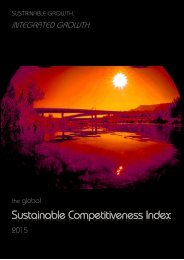The Global Sustainable Competitiveness Index 2019
Measuring competitiveness comprehensively: Sweden & Scandinavia tops, Germany #15, UK 17, US 34, China 37 in the Global Sustainable COmpetitiveness Index 2019
Measuring competitiveness comprehensively:
Sweden & Scandinavia tops, Germany #15, UK 17, US 34, China 37 in the Global Sustainable COmpetitiveness Index 2019
You also want an ePaper? Increase the reach of your titles
YUMPU automatically turns print PDFs into web optimized ePapers that Google loves.
Social Cohesion
Table of
Contents
6 Social Capital
The Social Capital of a nation is the sum of social stability and the well-being
(perceived or real) of the entire population. Social Capital generates social
cohesion and a certain level of consensus, which in turn delivers a stable
environment for the economy, and prevents natural resources from being overexploited.
Social Capital is not a tangible value and therefore hard to measure
and evaluate in numeric values. In addition to local historical and cultural
influences, the social consensus in a society is affected by several factors: health
care systems and their universal availability/affordability (measuring physical
health); income and asset equality, which are correlated to crime levels;
demographic structure (to assess the future generational balance within a
society); and freedom of expression, freedom from fear and the absence of
violent conflicts that are required for businesses to be able to generate value.
While a direct connection of social cohesion to creating wealth and sustain
economic development might be difficult to establish scientifically, a certain
degree of equality, adequate health systems, freedom from fear and equal
opportunities (without which no American Dream ever would have been
possible) are pre-requisites to achieve the same. The absence or deterioration of
social cohesion in turn leads to lower productivity (health), rising crime rates, and
potentially social unrest, paralysing economic development and growth.
Social Capital Indicators
Key elements of competitiveness
drivers in the Social Capital Sub-
Index
The indicators selected to measure social cohesion have been selected from the
5 themes above (health, equality, crime, freedom and age structure). Some of
these indicators (e.g. “happiness”) are qualitative, i.e. not based on
performance data that can be measured. Instead, qualitative indicators from
surveys and other sources compiled by recognised organisations were used to
measure the qualitative aspects of social cohesion, including single indicators
from the Happy Planet Index (New Economics Foundation), the Press Freedom
Index (Reporters Without Borders), and the Global Peace Index (Institute for
Economics and Peace). For the full list of used indicators, please refer to the
methodology section.
24








